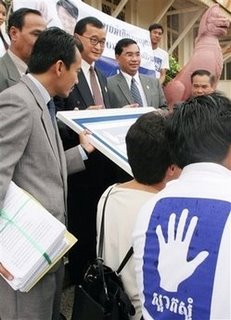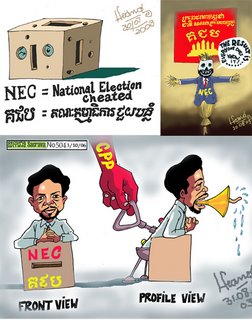2008 Election: Should the opposition Parties boycott the 08 Election?
It seemed the opposition leaders had ever asked that crucial question?
Should the political change have to go through the election?
After all, the election, if free and democratic, according to the constitution, is the popular verdict and peaceful way to reaffirm the political change or the status quo. The election, if free and democratic, is the emanation of the popular will.
But it is noteworthy the communist Party in power had never ever lost the election they had organized.
If the election were free and democratic the SRP would win without doubt.
Cambodian opposition leaders were intelligent. They knew so well that Hun Sen and the CPP will cheat, will use repression and assassination and will falsify the election results to get what the communist wants.
Hitherto, since 1993, Hun Sen and the CPP cooked the electoral results. Beforehand, they decided to attribute the number of National Assembly seats to each party as they pleased. The election organized by the communist in power, as usual, was not an election. It was a charade.
So why do the opposition leaders still participate the election? Why did the opposition leaders continue to play that charade?
SRP leaders quoted very often two election results to convince themselves and other people about her popularity: The SRP had defeated the CPP at Kraing Yau, Hun Sen home village, and Phnom Penh, boasted the SRP. This proves that the SRP is very popular and the SRP can defeat the CPP in the next election, said the SRP leaders.
If Hun Sen can falsify any election result, it is evident he could falsify certainly Kraing Yau and Phnom Penh election results too.
The SRP had defeated the CPP at Kraing Yau and Phnom Penh because Hun Sen would like the world to believe that the election were free, fair and democratic. Hun Sen would like to convince the world that Cambodia is democratic that is why the SRP defeated the CPP at Kraing Yau and Phnom Penh.
For the above reason it is obvious that Hun Sen needed the opposition parties to justify to the world that Cambodia is a democracy anchored on basic freedom. Without the opposition parties, especially the SRP, the current Cambodia political regime merely would be totalitarian.
How to denounce to the world the totalitarianism of the CPP?
One of the best approaches was the boycott of the election. The boycott is to deny Hun Sen government any democratic attribute. If the world were convinced of the CPP totalitarianism, then the world would not recognize the legitimacy of Hun Sen government. Then the world will dump Hun Sen government and the CPP and will work for a political change.
This chain reaction would end up in the political change that ought to go through free and democratic elections.
In order to have free, fair and democratic elections for Cambodia, the world community must organize, supervise, and monitor those elections to select Cambodia government.
Don't let Cambodia to become another TALIBAN Afghanistan.
In recapitulation, the aim of the boycott strategy was to get free and democratic elections which must be organized, supervised and monitored by the US or the EU or the United Nations or an international ad hoc committee or all the above in order to build from scratch the Cambodian National Army, National Police and Judiciary System and select the government of Cambodia.
The Weakness of the Boycott Solution
One cannot win with nothing. One cannot win with the Do Nothing strategy. Do nothing means postpone and wait for the next time that could be more favorable.
The SRP would win the 2008 election in the same way as did the opposition in Ukraine and Serbia, said the SRP leaders. Indeed, the communist Slobodan MILOSEVIC had won as usual his election in 2000 but was overthrown immediately by a popular uprising and Vojislav KOSTUNICA was installed as president.
A peaceful mass protest "Orange Revolution" in the closing months of 2004 forced the authorities to overturn a rigged presidential election and to allow a new internationally monitored vote that swept into power a reformist slate under Viktor YUSHCHENKO.
The civil society and the NGOs supported in general the SRP. They would help the SRP to win legally the 2008 election in the same way as in Serbia and Ukraine, said the SRP leaders.
Prediction For the 2008 Election
We would predict as following: Likely Hun Sen would proclaim as usual his victory in the 2008 election. But the opposition would not recognize that electoral results because of flagrant CPP cheating. The opposition would say that Hun Sen and the CPP had falsified those results. Then Cambodian people would rise to overthrow Hun Sen government as it were in the 1998 National Assembly election.
The CPP and the opposition are now advancing in locked step toward the 2008 showdown.
Remember The 1998 Election and the Failed Coups against Hun Sen.
During the past decade, secrete organization or people on their own initiative had attempted coups to overthrow Hun Sen government but all failed. In all, there were one failed coup, one failed assassination attempt and one failed popular uprising.
The following were rumors and comments that circulated among very closed Hun Sen advisors:
We remember very well in the last year of Lon Nol regime, the pilots So Potra and Pech Lim Khuon of Lon Nol Air Force picked their T28 and dropped a couple of 250 pounds bombs in order to decapitate Lon Nol Army leadership. Indeed, Lon Nol and his generals were meeting at the army headquarter. The couple of 250 pounds bombs had exploded but did not kill the generals. This served as lesson to other young pilots.
The MIG who followed the T28 example
A young pilot, trained in Moscow, told his friends that he hate the Vietnamese communist and their valets: one day I will bomb Hun Sen residence as the T28 did to Lon Nol headquarter.
Toward the first years of 2000s, the pilot with his MIG19 armed with a couple of 250 pounds bombs accelerated and climbed very fast in the sky, then picked and dropped the couple bombs on Hun Sen residence at Takhmau. But a dozen of Anti Aircraft Artillery batteries manned by Vietnamese specialists of Air defense were there to protect Hun Sen residence. Hun Sen was there too at that time. The Vietnamese AAA has destroyed the MIG. The MIG exploded and the two bombs unexploded plunged in Prek Toch. The pilot was killed. He planned to land his MIG at Malaysia. The pilot acted alone.
Hitherto, the Vietnamese maintained a complete blackout of news relative to this plot. But people at Prek Toch knew and continued to whisper comments about the two bombs dropping in their river. Since then, the Cambodian pilots were banned and only the Vietnamese pilots had access to the combat air force.
Attempt to kill Hoc Lundy
Even the Army and Police CPP officers hated Hoc Lundy. One high-ranking army CPP officer plotted to kill Hoc Lundy in 2000s. Hoc Lundy traveled to Saigon at that time by the commercial Air Vietnam. He scheduled to return to Phnom Penh by Air Vietnam.
On the convened hour of Hok Lundy return day, the plotter planted a bomb in the commercial Air Vietnam. Approaching Pochentong Airport, toward the end of the airstrip, the Air Vietnam plane exploded and killed all passengers and crewmembers.
Hok Lundi at the last minute changed mine and postponed his return. He was not in that plane.
The official principal reason of the explosion was a technical accident. Month later, the Vietnamese secret police arrested and executed secretly the plotter. The plotter's father was a very important personality of Hun Sen regime.
It is not safe to travel by road at night
Even in Phnom Penh. If you travel at night by road, you are safe as long as you are not caught in accident. If you do, people would come not to help you but to kill you with their long knife (Kap Ning Phkeak). Because they believe only Hun Sen people dared to travel at night. Since they hated Hun Sen people, they would kill any people they put hand on at night, said a Hun Sen advisors.
The 1998 Election and the popular riot.
Rappel of the facts: In 1998 election, Hun Sen and the CPP proclaimed the final electoral results giving the CPP the absolute majority in the National Assembly. Sam Raingsy and Ranariddh refused to recognize the validity of that result. They both accused Hun Sen for committing fraud and falsifying the electoral results.
Sam Raingsy and Ranariddh had no armed forces support. These two leaders were unable to set up an armed forces organization when they were Resistance Chief Commander at Thai border and afterward Prime Minister. They were too clanist. They were unable to raise themselves above the family, the clan, and the cronyism. They lacked the team spirit. They were all in the learning curve.
More than one hundred thousand Vietnamese soldiers heavily armed with several hundred tanks T54 and T55 and dozen of thousand artillery and air defense AAA and air force hitherto surrounded Phnom Penh.
In 1998, forty thousand of Cambodian people rose up and demonstrated during a month in Phnom Penh streets to overthrow Hun Sen government. At the same time, thirty thousand of Khmer Rouge and Khmer Nationalist Forces were infiltrated secretly into Phnom Penh area ready to fight from inside to outside Phnom Penh the Vietnamese armed forces.
During the 1998 Cambodian riot, Khmer Nationalist forces were waiting for the green light from the US embassy to Phnom Penh. Cambodian Nationalist Forces needed a firm promise of financial support and arms supplies of any western country such as the US, the United Kingdom, the Germany or the EU, or all the above to fight against Vietnamese forces to defend Cambodia sovereignty, independence, and territorial integrity.
In 1998, one hundred thousand Vietnamese Armed Forces attacked Cambodian forces everywhere at the outer Phnom Penh perimeters.
In 1998, it was the Clinton administration. Cambodian Nationalist Forces waited for so long the support of Clinton administration to free Cambodia from the Vietnamese occupation. There was no answer from the Clinton administration. The US had abandoned us for the second time.
Without the US support and without the EU support Cambodia alone cannot defend her freedom, sovereignty and independence against the Vietnamese armed forces occupation of Cambodia. Finally, Cambodian Nationalist Forces disbanded and fused into Phnom Penh people, then withdrew and returned secretly to their bases waiting for the next time.
The Vietnamese persevered and trained new generation of officers to fight these Nationalist Forces and tried and tried hitherto with few successes to decapitate their leadership.
Baphuon
» Read more!















